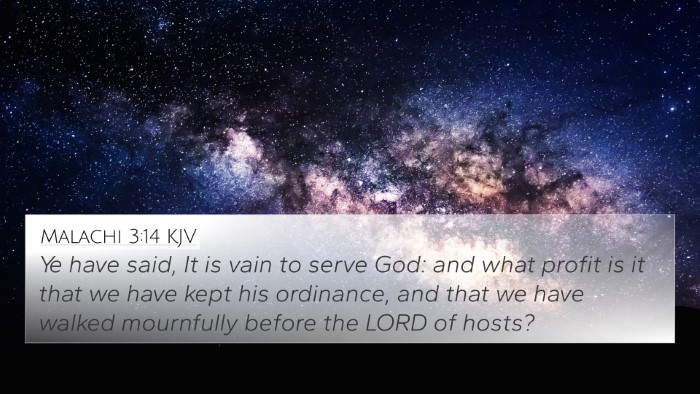Old Testament
Genesis Exodus Leviticus Numbers Deuteronomy Joshua Judges Ruth 1 Samuel 2 Samuel 1 Kings 2 Kings 1 Chronicles 2 Chronicles Ezra Nehemiah Esther Job Psalms Proverbs Ecclesiastes Song of Solomon Isaiah Jeremiah Lamentations Ezekiel Daniel Hosea Joel Amos Obadiah Jonah Micah Nahum Habakkuk Zephaniah Haggai Zechariah MalachiJob 35:3 Similar Verses
Job 35:3 Cross References
For thou saidst, What advantage will it be unto thee? and, What profit shall I have, if I be cleansed from my sin?
Uncover the Rich Themes and Topics of This Bible Verse
Listed below are the Bible themes associated with Job 35:3. We invite you to explore each theme to gain deeper insights into the Scriptures.
Job 35:3 Cross Reference Verses
This section features a detailed cross-reference designed to enrich your understanding of the Scriptures. Below, you will find carefully selected verses that echo the themes and teachings related to Job 35:3 KJV. Click on any image to explore detailed analyses of related Bible verses and uncover deeper theological insights.

Job 34:9 (KJV) »
For he hath said, It profiteth a man nothing that he should delight himself with God.

Job 21:15 (KJV) »
What is the Almighty, that we should serve him? and what profit should we have, if we pray unto him?

Job 10:15 (KJV) »
If I be wicked, woe unto me; and if I be righteous, yet will I not lift up my head. I am full of confusion; therefore see thou mine affliction;

Job 31:2 (KJV) »
For what portion of God is there from above? and what inheritance of the Almighty from on high?

Malachi 3:14 (KJV) »
Ye have said, It is vain to serve God: and what profit is it that we have kept his ordinance, and that we have walked mournfully before the LORD of hosts?
Job 35:3 Verse Analysis and Similar Verses
Understanding Job 35:3
Job 35:3 states: "For you say, ‘What advantage will it be to you? What profit shall I have, more than if I had sinned?’" This verse is spoken by Elihu as he engages with Job, questioning the purpose behind Job’s complaints and thoughts regarding his suffering.
Verse Meaning and Context
This passage serves as a pivotal moment in Elihu's discourse, who seeks to challenge Job's attitude towards God's justice and the implications of his suffering. Through a combination of insights from various public domain commentaries, we can delve deeper into the meaning and context of this verse.
-
Matthew Henry's Commentary:
Henry emphasizes Elihu's role as a divine messenger. He criticizes Job's approach to suffering, arguing that questioning God’s justice is futile. Elihu is prompting Job to understand that piety and sin both bear consequences in their measure of earthly and spiritual benefits.
-
Albert Barnes' Notes:
Barnes highlights the irrelevance of Job's complaints about the benefit of righteousness versus sinfulness. He proposes that rationalizing suffering does not alter God's nature or the inversion of justice. Instead, Elihu suggests that Job's focus should be realigned towards a humble reception of God's governance.
-
Adam Clarke's Commentary:
Clarke notes that Elihu is attempting to convey that Job's assertions carry misunderstanding about divine justice. He portrays a theme of accountability, reminding Job that his attitude affects not only his state but also how he perceives God’s righteousness.
Thematic Insights
The themes arising from Job 35:3 revolve around the nature of suffering, righteousness, and divine justice. Here are some key points:
- Suffering and Righteousness: The verse underscores the struggle between perceived righteousness and the reality of suffering. It challenges the belief that suffering is purely a consequence of sin.
- Divine Justice: Elihu’s argument proposes that God’s justice is not contingent upon human understanding or experiences. Job’s questioning reflects a common human tendency to doubt in times of adversity.
- Attitude Towards God: The attitude shown in Job’s lament contrasts with the ideal approach of humility and submission to God’s will, as suggested by Elihu.
Cross-References
Diving deeper into scripture, various verses can be identified that reflect similar themes or conversations. Here are some cross-references related to Job 35:3:
- Job 4:17: “Shall mortal man be more just than God?” - This highlights the questioning of human righteousness in comparison to divine justice.
- Job 9:2: “Indeed I know that this is true. But how can mere mortals prove their innocence before God?” - Job wrestles with the idea of justice before God.
- Job 13:23-24: “How many wrongs and sins have I committed? Show me my offense and my sin. Why do you hide your face and consider me your enemy?” - This reflects Job's struggle in understanding his suffering.
- Isaiah 45:9: “Woe to those who quarrel with their Maker.” - A warning against questioning God’s plans.
- Romans 9:20: “But who are you, a human being, to talk back to God?” - Paul echoes the sentiment that human understanding is limited compared to God’s sovereignty.
- Psalms 94:9: “Does he who fashioned the ear not hear? Does he who formed the eye not see?” - A reminder of God’s omniscience regarding our thoughts and actions.
- Ecclesiastes 7:14: “When times are good, be happy; but when times are bad, consider…” - It emphasizes the need to reflect on life’s hardships.
- James 1:3-4: “Because you know that the testing of your faith produces perseverance.” - A New Testament reminder that trials serve a purpose.
- Romans 5:3-4: "Not only so, but we also glory in our sufferings, because we know that suffering produces perseverance." - This connects suffering with spiritual strengthening.
- 2 Corinthians 12:9: "My grace is sufficient for you, for my power is made perfect in weakness." - An affirmation of God’s power in human suffering.
Conclusion
In essence, Job 35:3 creates an inter-Biblical dialogue by highlighting the complexities of suffering, justice, and human understanding of God. Elihu’s challenges to Job are as relevant today as they were in the time of Job, reminding readers of the need for humility before divine sovereignty and the acceptance of God's unfathomable ways. This verse, alongside its related passages, provides a framework for deeper reflection into the themes present throughout both the Old and New Testaments.
Additional Resources for Bible Study
For readers looking to enhance their understanding of Biblical scriptures and their interconnections, consider utilizing:
- Bible Concordances: Tools to find specific verses and their meanings.
- Bible Cross-Reference Guides: Resources that help trace thematic connections across the Bible.
- Cross-reference Bible Study Methods: Systematic approaches to studying related verses.
- Bible Reference Resources: Comprehensive materials for linking scriptures.





